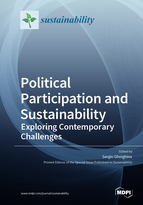Political Participation and Sustainability: Exploring Contemporary Challenges
A special issue of Sustainability (ISSN 2071-1050).
Deadline for manuscript submissions: closed (31 July 2021) | Viewed by 29878
Special Issue Editor
Special Issue Information
Dear Colleagues,
Over the last two decades, the literature on political participation flourished to reflect the increasing use of diverse modes of citizens’ involvement. These include the established modes of participation such as voting, protests, mass demonstrations, or petition signing, but also newer modes specific to the online environment (ICT-related), participation in referendums, public consultations, or engagement in political deliberation. The importance and intensity of these modes is reflected both in the number of people getting involved and in the increasing number of policies that are subject to various modes of participation on a regular basis. There is extensive literature about how these modes of participation function, why people get involved, and the consequences of their participation.
However, limited attention is paid to the relationship between political participation and the pursuit of sustainability at local, regional or central level. Existing studies indicate that citizen engagement can be a cost-effective method to characterize changes of local environments, but not much is known beyond this process. This Special Issue aims to address this void in the literature and brings together contributions that analyze the how participation can be associated with sustainability and local development in various settings. It explores the relationship between political participation and the management of their local environment. The Special Issue enhances the existing knowledge and understanding about how modes of participation can be reflected in stronger sustainability. The Special Issue provides the space for an academic debate that addresses issues such as climate change, resource allocation, or the pursuit of sustainability programs and policies. The contributions include a mix of single-case studies and comparative analyses across European countries.
Dr. Sergiu Gherghina
Guest Editor
Manuscript Submission Information
Manuscripts should be submitted online at www.mdpi.com by registering and logging in to this website. Once you are registered, click here to go to the submission form. Manuscripts can be submitted until the deadline. All submissions that pass pre-check are peer-reviewed. Accepted papers will be published continuously in the journal (as soon as accepted) and will be listed together on the special issue website. Research articles, review articles as well as short communications are invited. For planned papers, a title and short abstract (about 100 words) can be sent to the Editorial Office for announcement on this website.
Submitted manuscripts should not have been published previously, nor be under consideration for publication elsewhere (except conference proceedings papers). All manuscripts are thoroughly refereed through a single-blind peer-review process. A guide for authors and other relevant information for submission of manuscripts is available on the Instructions for Authors page. Sustainability is an international peer-reviewed open access semimonthly journal published by MDPI.
Please visit the Instructions for Authors page before submitting a manuscript. The Article Processing Charge (APC) for publication in this open access journal is 2400 CHF (Swiss Francs). Submitted papers should be well formatted and use good English. Authors may use MDPI's English editing service prior to publication or during author revisions.
Keywords
- political participation
- citizen engagement
- political institutions
- sustainability






